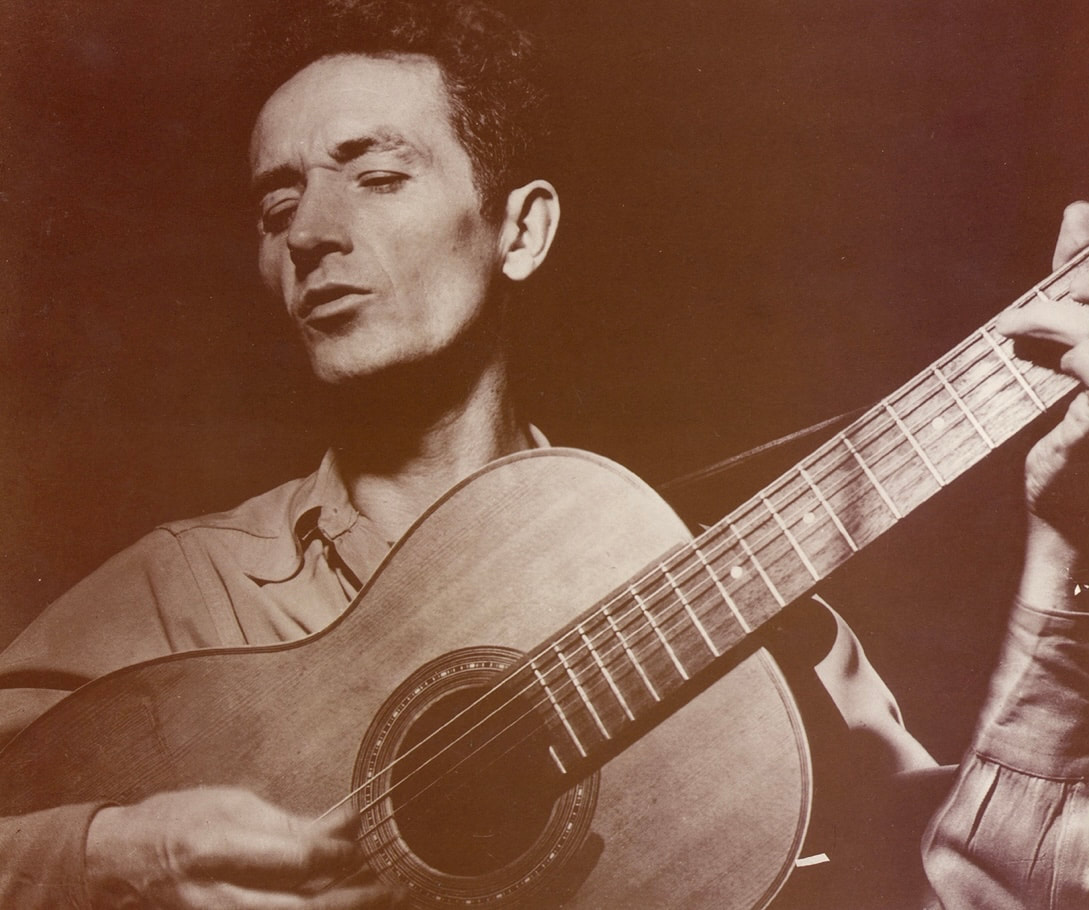Guthrie is a legendary singer and song writer, and considered one of the most significant figures in American folk music. Perhaps most widely known for his song, “This Land is Your Land,” Guthrie wrote hundreds of country, folk and children’s songs before dying in 1967 from complications of Huntington’s disease.
Thanks to artists like Putnam, however, Guthrie’s legacy lives on. Putnam will pay tribute to Guthrie in a special performance, Woody Guthrie In Song & Conversation, which will take place at 2 p.m. August 14 at the Wendel Center for Art Education.
Putnam, who lives in Knox County, has played folk and other genres of music for more than 50 years. He will perform on the guitar, banjo, fiddle and slide guitar.
Putnam shared how he tries to capture Guthrie’s distinct musical delivery in his performances, as well as what attendees at the Aug. 14 performance can expect.
How did you first came to admire the work of Woody Guthrie?
I grew up singing and playing folk music with my family, so, of course, I came across the music of Woody Guthrie very early. I remember playing “This Land Is Your Land” on ukuleles with my dad and siblings. That song was everywhere during the folk music revival of the 1960s in a somewhat sanitized, feel-good, patriotic anthem kind of way.
Not until I was an adult did I get to hear all Woody’s verses, and, like me, listeners at the show may be surprised to hear the biting social commentary of the later verses. I think also that I was unaware of the tragic aspects of his late-in-life hereditary illness until I saw the movie, “Alice’s Restaurant,” featuring his son Arlo. That movie contains a harrowing scene of Woody, incapacitated and institutionalized at the end of his life, being serenaded by his son, Pete Seeger, and others in the hospital. Strong stuff. My admiration for him only grew as I researched and performed his life story.
How long have you presented a portrayal of Guthrie?
I first portrayed Woody for a long-running Chautauqua living history series in Mount Vernon in 2010. I had an open invitation to “do” a historical figure, and it occurred to me that I could combine my interest in history with my musical interests and skills. Woody Guthrie seemed like a good choice because of the relative simplicity of his music, his appealing and vivid personality, and his propensity to pop up at key times and events in U.S. history.
I have since done versions of the show half a dozen times in Mount Vernon, at Kenyon College in Gambier, and in Columbus for the Columbus Folk Music Society’s 100th birthday celebration for Woody in 2012. I’m excited to get the chance to bring Woody and his story to DACO in connection with its fantastic exhibit on the Great Depression and the pandemic.
When portraying him, what are some aspects you strive to hit accurately?
Woody had a very distinctive musical delivery, which I do try to capture, although my voice is really too “pretty” for Woody. His phrasing and diction can be heard very clearly in the sound of the early Bob Dylan and others like Arlo Guthrie, Jack Elliot and even Bruce Springsteen, Billy Bragg and John Mellencamp.
As for authenticity, I walk a fine line between trying to sound like Woody and sounding “good,” which don’t always overlap. On two songs in particular, I do “hybrid” versions because Woody’s originals are problematic for different reasons. “Pastures of Plenty” I do on the banjo in Pete Seeger’s version because that’s the best known and it’s also rearranged in a minor key, which almost none of Woody’s originals are. So it adds variety to the mix. I also do “Vigilante Man,” a very powerful, lesser-known song, in the style of Bruce Springsteen and Ry Cooder just because their versions are terrific.
As for staying in character, I try to, even through the Q&A at the end of the show, but sometimes audience members will ask questions that I need to break character to answer.
What is your favorite Woody Guthrie song and why?
That’s a tough one. He wrote over a thousand (that we know of), but I’d say two I especially like are “Pretty Boy Floyd” and “Deportee.” The former tells the story of a Robin Hood-like bank robber of the 1930s who had the reputation of helping poor farmers who’d lost their homes in the Great Depression to what Woody saw as hard-hearted mortgage bankers. It contains the matchless lines “As through this world I’ve rambled, I’ve met lots of funny men/Some will rob you with a six-gun, and some with a fountain pen.”
“Deportee,” probably the last song Woody wrote, describes a plane crash in California that killed migrant agricultural workers being flown back to Mexico. Outraged that The New York Times article named the pilots but described the dead passengers as just “deportees,” Woody decided to memorialize them by “saying their names.”
In your experience portraying him and researching him, are there any interesting notes about him as a person or performer that you have come across that most may not realize?
He was a man of immense contradictions. His sympathy for society’s downtrodden was unlimited and his energy in fighting for their rights truly staggering. At the same time, he neglected, then abandoned his first wife and their children, alienated his second wife and family, and lost many of his oldest friends through outrageous and egregious behavior. His impulse control was practically nonexistent. Yet they all stuck with him through the 15 or so years of his decline and nursed him through his final sickness. In spite of his difficult personality, he was loved and cherished.
What can attendees expect to hear during your performance?
I’ll be doing nine songs, most of them well known. They include “Rambling Around,” “I Ain’t Got No Home,” “Pretty Boy Floyd,” “So Long, It’s Been Good to Know You,” “Vigilante Man,” “Do Re Mi,” “Pastures of Plenty,” “Deportee (Plane Wreck at Los Gatos,” and, of course, “This Land Is Your Land.” The structure of the show has a narrative of Woody’s colorful and peripatetic life during the 1930s and beyond, with songs from the different times and places interspersed. I suspect that Woody will also have something to say about how the lessons of the 1930s and Great Depression can also be applied to other historical periods in our nation’s history.
What role has music played in your life?
I play guitar and banjo mostly, and also some fiddle, mandolin, bass guitar and tin whistle. I enjoy folk, roots and Americana, but have also played in classic rock and bluegrass bands. I perform with my wife, Martha Morss. We especially like singing harmonies of musicians like the Everly Brothers, the classic old-time “brother” groups like the Delmores and Blue Sky Boys, and British Invasion stalwarts like the Beatles, Hollies, Searchers, and Peter and Gordon. I’m also a huge classical music fan.
Music has been such a big part of my life. I can’t imagine how deprived I would have been without it. I’ve met many valued friends through music over the years, and I’m looking forward to meeting some new ones in Lancaster on August 14.
Cost for Woody Guthrie In Song & Conversation is $5 for DACO members and $10 for non-members for tickets purchased in advance. Cost at the door is $15. Registration is available online.


 RSS Feed
RSS Feed